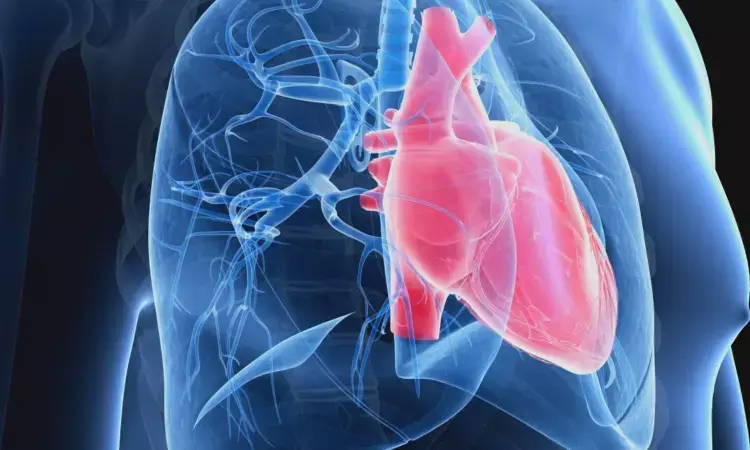- Home
- Medical news & Guidelines
- Anesthesiology
- Cardiology and CTVS
- Critical Care
- Dentistry
- Dermatology
- Diabetes and Endocrinology
- ENT
- Gastroenterology
- Medicine
- Nephrology
- Neurology
- Obstretics-Gynaecology
- Oncology
- Ophthalmology
- Orthopaedics
- Pediatrics-Neonatology
- Psychiatry
- Pulmonology
- Radiology
- Surgery
- Urology
- Laboratory Medicine
- Diet
- Nursing
- Paramedical
- Physiotherapy
- Health news
- Fact Check
- Bone Health Fact Check
- Brain Health Fact Check
- Cancer Related Fact Check
- Child Care Fact Check
- Dental and oral health fact check
- Diabetes and metabolic health fact check
- Diet and Nutrition Fact Check
- Eye and ENT Care Fact Check
- Fitness fact check
- Gut health fact check
- Heart health fact check
- Kidney health fact check
- Medical education fact check
- Men's health fact check
- Respiratory fact check
- Skin and hair care fact check
- Vaccine and Immunization fact check
- Women's health fact check
- AYUSH
- State News
- Andaman and Nicobar Islands
- Andhra Pradesh
- Arunachal Pradesh
- Assam
- Bihar
- Chandigarh
- Chattisgarh
- Dadra and Nagar Haveli
- Daman and Diu
- Delhi
- Goa
- Gujarat
- Haryana
- Himachal Pradesh
- Jammu & Kashmir
- Jharkhand
- Karnataka
- Kerala
- Ladakh
- Lakshadweep
- Madhya Pradesh
- Maharashtra
- Manipur
- Meghalaya
- Mizoram
- Nagaland
- Odisha
- Puducherry
- Punjab
- Rajasthan
- Sikkim
- Tamil Nadu
- Telangana
- Tripura
- Uttar Pradesh
- Uttrakhand
- West Bengal
- Medical Education
- Industry
Asporin Promising Protective Target in Pulmonary Arterial Hypertension Identifies New Multiomics Study

USA: A recent study published in the journal Circulation has revealed that the asporin gene could be a promising therapeutic target for patients with pulmonary arterial hypertension (PAH).
Recent research employing integrative multiomics techniques has illuminated the potential of asporin as a protective factor in PAH. The study, which combined genomic, transcriptomic, proteomic, and metabolomic data, offers new insights into the mechanisms underlying PAH and highlights the promising role of asporin in combating this severe condition.
The researchers identified two gene network modules linked to vascular cells, with asporin emerging as a central hub gene. Asporin was observed to be upregulated in the lungs and plasma of PAH patients and was associated with reduced disease severity.
Pulmonary arterial hypertension is a progressive disease characterized by elevated blood pressure in the pulmonary arteries, leading to heart failure and reduced exercise capacity. Despite advances in treatment, managing PAH remains challenging due to its complex pathophysiology and the need for more targeted therapies.
Integrative multiomics can help us understand pulmonary arterial hypertension better, but getting human lung samples from PAH patients is quite rare. Considering this, Jason Hong, Division of Pulmonary and Critical Care Medicine, University of California, Los Angeles, and colleagues used integrative multiomics to investigate the pathobiology of PAH through transcriptomic profiling and deep phenotyping of the largest multicenter PAH lung biobank.
The researchers utilized transcriptomic profiling and extensive phenotyping from the largest multicenter PAH lung biobank to date, which included 96 PAH samples and 52 control samples. This was integrated with clinicopathologic data, genome-wide association studies, Bayesian regulatory networks, single-cell transcriptomics, and pharmacotranscriptomics.
The study revealed the following findings:
- Two potentially protective gene network modules associated with vascular cells were identified, and ASPN was validated, coding for asporin, as a key hub gene that is upregulated as a compensatory response to counteract PAH.
- Asporin is upregulated in the lungs and plasma of multiple independent PAH cohorts and correlates with reduced PAH severity.
- Asporin inhibits proliferation and transforming growth factor–β/phosphorylated SMAD2/3 signaling in pulmonary artery smooth muscle cells from PAH lungs.
- In Sugen-hypoxia rats, ASPN knockdown exacerbated PAH, while recombinant asporin attenuated the condition.
"The integrative systems biology approach used to analyze the PAH lung transcriptome revealed asporin as a new potential therapeutic target with protective effects in pulmonary arterial hypertension," the researchers concluded.
Reference:
Hong J, Medzikovic L, Sun W, Wong B, Ruffenach G, Rhodes CJ, Brownstein A, Liang LL, Aryan L, Li M, Vadgama A, Kurt Z, Schwantes-An TH, Mickler EA, Gräf S, Eyries M, Lutz KA, Pauciulo MW, Trembath RC, Perros F, Montani D, Morrell NW, Soubrier F, Wilkins MR, Nichols WC, Aldred MA, Desai AA, Trégouët DA, Umar S, Saggar R, Channick R, Tuder RM, Geraci MW, Stearman RS, Yang X, Eghbali M. Integrative Multiomics in the Lung Reveals a Protective Role of Asporin in Pulmonary Arterial Hypertension. Circulation. 2024 Aug 21. doi: 10.1161/CIRCULATIONAHA.124.069864. Epub ahead of print. PMID: 39167456.
Dr Kamal Kant Kohli-MBBS, DTCD- a chest specialist with more than 30 years of practice and a flair for writing clinical articles, Dr Kamal Kant Kohli joined Medical Dialogues as a Chief Editor of Medical News. Besides writing articles, as an editor, he proofreads and verifies all the medical content published on Medical Dialogues including those coming from journals, studies,medical conferences,guidelines etc. Email: drkohli@medicaldialogues.in. Contact no. 011-43720751


